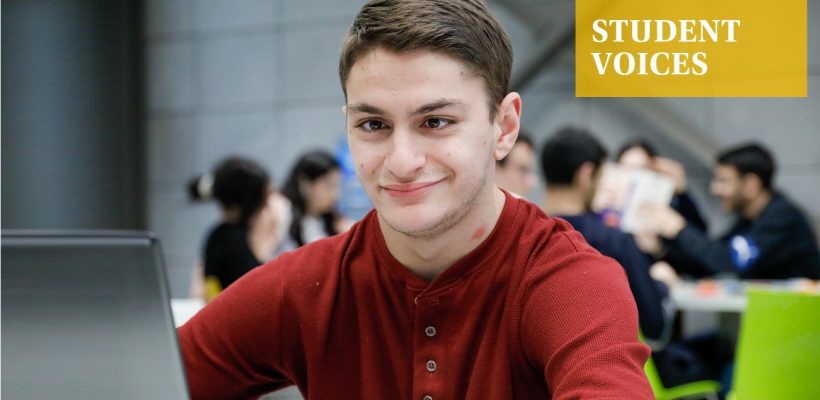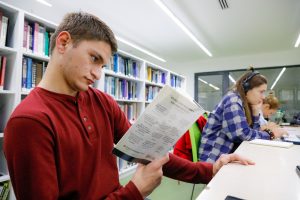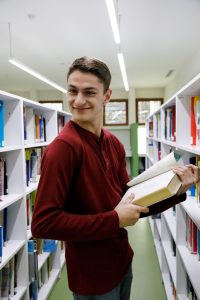
The Challenges of Living and Studying with Disability
3 min readContributed by Areg Barseghyan (BAEC ‘24)
Life with Disability in Armenia and AUA
I was diagnosed with cerebral palsy at a very young age. That’s when I understood that life will be full of challenges. Although in Armenia a lot of people with disabilities are beset by a sense of shame, I never felt ashamed of my disability, nor did my parents.
Thankfully, I’m currently attending the American University of Armenia (AUA) and getting a quality education from courses taught by the best professors. When I entered AUA, I started majoring in business, but recently changed to English and communications because I felt like I didn’t belong. Business was too complicated for me, whereas the humanities have interested me the most. I’m a very sociable person and I love writing. I write essays almost every day. I’m also multilingual. I am fluent in four lan guages: Armenian, Russian, English, and Ukrainian, and I have basic knowledge of Spanish and German. So, I believe that pursuing a BA in English and Communications (BAEC) is the right choice for me.
guages: Armenian, Russian, English, and Ukrainian, and I have basic knowledge of Spanish and German. So, I believe that pursuing a BA in English and Communications (BAEC) is the right choice for me.
At AUA, like in any other community, people are different. Sometimes I get evasive looks, but I try to ignore those and focus on the good things around me. Overall, I feel comfortable and supported. There are many good people everywhere on campus, students and professors alike, always ready to help. I would like to make a special mention of Dr. Mica Hilson, Chair of the English and Communications program, who especially helped me map out the most optimal approach for making the switch to EC.
Stereotypes About People with Disabilities
I think many Armenians hold very conservative dispositions when it comes to talking to, hanging out with, or trusting a person with disabilities, because most people stereotype them. Having lived abroad for sixteen years, one of the reasons why I moved back to Armenia in 2020 is because I want to change people’s mindsets about people with disabilities. I know that I’m the person who can do this but, unfortunately, I have faced many difficulties in the two years I’ve lived in Armenia, including discrimination and stereotyping.
 The first stereotype I have encountered is that a disabled person can’t work or study. The fact that I have a disability, does not mean I can’t work or study. I have been experiencing this stereotype a lot since coming back to Amenia. Once a girl in a hospital reception asked my father, “Where does your son study?” My father said, “Why don’t you ask him?” Then the girl turned to me,” Where do you study?” I proudly said, “American University of Armenia.” She looked at my father, waiting for confirmation, while he looked away and said nothing. At that very moment I felt like I won the Super Bowl, because while she had underestimated me, I had made a positive impression on her.
The first stereotype I have encountered is that a disabled person can’t work or study. The fact that I have a disability, does not mean I can’t work or study. I have been experiencing this stereotype a lot since coming back to Amenia. Once a girl in a hospital reception asked my father, “Where does your son study?” My father said, “Why don’t you ask him?” Then the girl turned to me,” Where do you study?” I proudly said, “American University of Armenia.” She looked at my father, waiting for confirmation, while he looked away and said nothing. At that very moment I felt like I won the Super Bowl, because while she had underestimated me, I had made a positive impression on her.
The second stereotype is that a disabled person can’t be trusted. In November 2021, I did two surveys about cerebral palsy and other disabilities that exist in Armenia. I was surprised with the results, which did not mirror the reality I have personally witnessed. According to the survey results, most people in Armenia would trust a stranger with disabilities, which, based on my experience, has not been the case. I can’t ask anyone for directions when I get lost. There were times when I asked passers-by for direction, and they would just walk away, without even responding to me.
I believe that everyone is created equal. One shouldn’t judge a person by their nationality, religion, orientation, color of skin, and physical looks or capabilities. We’re all human after all. Hopefully, one day, Armenia will become more inclusive.
